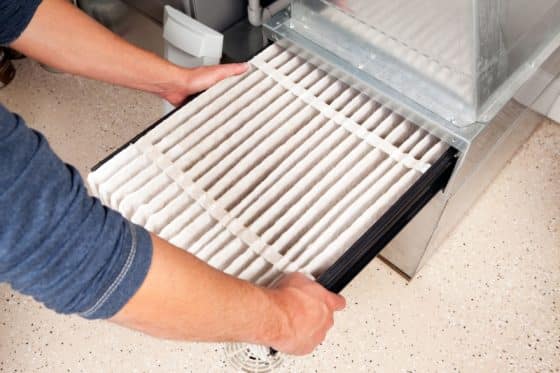
You may think that replacing your furnace filter is as easy as checking the model number and going to the store and buying a new one. However, there are many different options, each with its own pros and cons, that you should be aware of.
Fiberglass Filters
One of the most commonly available types of furnace filters is the fiberglass filter. Many people think of fiberglass as that pink-looking insulation material in the attic and walls, but it is actually an efficient and affordable alternative filtering material. Fiberglass filters are often the least expensive option on the market, and they are widely available.
These disposable filters will last around 30 days and are great at filtering out large airborne particles that can be damaging to your furnace. If no one in your household has respiratory sensitivities, like asthma or COPD, then fiberglass filters can be a great option. These filters have a MERV rating between 2 and 3.
Pleated Filters
Pleated filters look much like the side of an accordion. The various folds help to provide more surface area for the filter to catch unwanted airborne particles as air passes through it. Pleated filters can be made out of paper, cotton, or even polyester. These furnace filters will typically last between one to three months, depending on the specific household environmental factors.
Pleated filters tend to be the most commonly purchased by homeowners as they strike the perfect balance between effectiveness and affordability. These filters have a MERV rating between 8 and 13. They’re more effective at removing smaller airborne particles than your typical fiberglass air filter, and they’re sometimes recyclable in addition to often being made of sustainable materials, so they’re better for the environment.
Electrostatic Filters
Electrostatic filters work by creating a static magnet for dust and other unwanted airborne pollutants. They’re typically constructed of cotton and paper fibers that are magnetized to keep small particles from spreading. Electrostatic filters are available in both disposable and reusable formats.
These filters can be a great choice for effective filtering at an affordable price. However, electrostatic filters are more effective at removing smaller pollutants than larger ones, like dust and mold spores. They may not be the best option for households that have respiratory illnesses or allergies.
Washable (Reusable) Filters
While the majority of furnace filters on the market today are disposable, there are some that are washable. Instead of having to replace your filter every 30 to 90 days, you can simply wash it with soap and water. However, it’s crucial that washable filters are completely dry before you reinstall them. Otherwise, the excess moisture on their surface can create the perfect breeding ground for mold and mildew.
This eco-friendly alternative will last you for up to 10 years, which makes it super cost-effective. However, washable filters only have a maximum MERV rating of 4. They’re effective for filtering out dust mites, pollen, and loose carpet fibers. They are not built for smaller airborne particles like mildew spores, hair spray, and cooking byproducts. If no one in your household suffers from environmental allergies or respiratory illnesses, then a washable filter may be the way to go.
HEPA Filters
High-efficiency particulate air filters, also known as HEPA filters for short, are the most effective at removing all different sizes of airborne particles. Apart from the normal airborne pollutants like dust and pollen, HEPA filters can also remove unwanted bacteria and viruses from the air. While HEPA filters can utilize UV light to clean the air, most residential HEPA furnace filters utilize active carbon for filtration. They have a MERV rating of between 17 and 20.
A HEPA filter can be a great option if you have individuals in your household who suffer from respiratory conditions and allergies. However, HEPA filters can be a fairly expensive option for the average homeowner. It’s also important to note that HEPA filters tend to decrease the airflow in your HVAC system because of their high filtering activity. This means that you’ll likely spend more on energy costs to run your furnace when you have a HEPA filter installed, and if your furnace is older, this might increase wear and tear.
A Note on MERV Ratings
Each furnace filter on the market will have a MERV rating associated with it. This will tell you the efficiency level of the filter on a scale ranging from 1 to 20. The higher the MERV rating is, the more airborne particles it will filter out of your indoor air. Fiberglass and washable filters tend to be at the low end of the MERV spectrum, while pleated and HEPA filters are towards the higher end.
The higher the MERV rating, the more expensive the filter is going to be. Filters with a high MERV rating need to be replaced more often. They also can reduce the airflow in your HVAC system. Because of the thickness of their filtering, your furnace has to work harder to force air through the filter. This can result in higher energy costs than with lower MERV rating filters.
Respiratory Illness and Allergy Sufferers
The type of filter that you choose to run in your furnace will depend on the health of the people residing in your home. If everyone is healthy, then you can choose any type of filter that you would like. Pleated tend to be the most common as they offer great filtering capability at an affordable price for the average homeowner.
However, if anyone in your household suffers from a respiratory illness or allergies, you’ll want to consider purchasing a more effective filter. HEPA filters are always a great option to help remove as many unwanted airborne pollutants as possible. In fact, they’ve been proven to successfully remove 99.97% of all airborne particles that are 0.3 microns or bigger. This means pollen, dust, mold spores, bacteria, and viruses.
Pets in the Home
Pets can be a basket full of joy that provide comfort for our families. However, the dander and hair that they lose on a regular basis can wreak havoc on our sinuses. With consistent air flowing throughout the vents in your home, pet dander can be constantly kicked up into the air.
If you have one or more pets in your home, you’ll want to consider investing in a filter with a MERV rating of at least 10. This brings you to the pleated and HEPA filters that offer more filtering capability to collect that unwanted pet dander from circulating throughout your home.
Top-quality Heating Services
McGowan's Heating & Air Conditioning provides premier heating services to Jacksonville, Florida, and the surrounding area. With our premium maintenance program, you’ll never have to worry about whether or not you’re getting the right HVAC system filter. We can also help with all of your cooling, new home construction, indoor air quality, air duct cleaning, attic insulation, commercial, mobile home, and HVAC design needs. Pick up the phone and call us today to get the assistance that you need.



